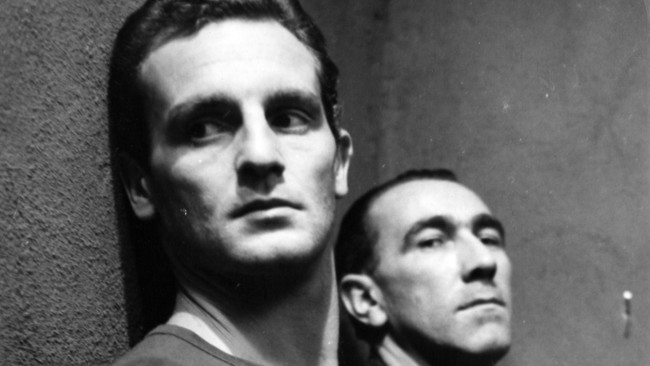Goings On: Becker, Melville, and More

New York. “Rapturously received but mysteriously forgotten after its 1964 New York opening, Jacques Becker’s prison drama, Le trou (The Hole), returns, digitally restored, for a week at Film Forum,” begins J. Hoberman in the New York Times. “Becker served as Jean Renoir’s assistant throughout the 1930s and was interned for a year by the Germans during the occupation of France. Both experiences inform Le trou. The camaraderie of five prisoners sharing a cell and working together on a tunnel to freedom has something of the Renoir spirit; the movie’s sense of claustrophobia and obsession with prison procedure bespeaks firsthand knowledge.” In the Village Voice,Bilge Ebiri calls Le trou “one of the most gripping of all French films.” Screens today through Tuesday, and for more reviews, turn to Critics Round Up.
As mentioned on Sunday, the BAMcinématek series Edgar Wright Presents Heist Society is now on through July 23. “Nowhere is the car chase more finely tuned than in Walter Hill’s understated 1978 crime noir The Driver, which ushered in the use of high-octane pursuits and set the course for future filmmakers,” writes William Carroll for Little White Lies. Screens Friday. And from the New Yorker’s Richard Brody: “In 1973, Clint Eastwood, who was already a major star, produced and acted in Michael Cimino’s first film as a director, Thunderbolt and Lightfoot. . . . Cimino’s film is a heist movie with a difference: it withholds the crime story until midway through the film. Before that, it’s a rough-and-tumble, back-road Northwest adventure that’s also a buddy comedy, even a proto-bromance.” Sunday.
Melissa Anderson in the Village Voice: “The recent release of Sofia Coppola’s subdued rethink of The Beguiled occasions BAMcinématek’s peerlessly deranging Southern Gothic series, sixteen films saturated with grotesqueries and perversions, repression and delusion, the unutterable and too much overcompensatory talk. Watching these movies, released between 1941 and 1997, comes with somatic risk: While revisiting or viewing for the first time a handful of the titles in this rank, ripe retro, I often found myself clutching my stomach, unable to metabolize so much onscreen pathology. These films, filled with the monstrous and the still unreconciled past, hit me in the gut.” At Screen Slate, Chris Shields recommends Reflections in a Golden Eye (1967), “an essential and illuminating stop in [John] Huston’s peerless filmography.”
Tomorrow, Videology presents The Wind Will Carry Us (1999), followed by a discussion with Godfrey Cheshire, whose Indiegogo campaign for In the Time of Kiarostami: Writings on Iranian Cinema has three more days to go, and Iman Tavassoly, co-translator of In the Shadow of Trees: The Collected Poetry of Abbas Kiarostami.
“There’s no center to Robert Altman’s 1973 masterpiece The Long Goodbye,” writes Patrick Dahl at Screen Slate. “Like its hero, the film proceeds in mumbled, self-satisfied rambling interrupted by the occasional shock of violence.” Novelist Yuri Herrera, who’ll be on hand for tomorrow night’s screening at the Film Society of Lincoln Center: “From the very first scene, Elliot Gould’s Marlowe embraces his tenderness as a source of strength.”
Pacho Velez and Sierra Pettengill’s The Reagan Show is “a lively documentary that posits ‘the Great Communicator’ as the first president to be calculatedly dependent on and a product of media performance,” writes Tony Pipolo for Artforum. Opens Friday at the Metrograph; for more reviews, see Critics Round Up.
Los Angeles. “With deep roots in underground film, art, and music, filmmaker and lecturer Irwin Swirnoff hosts a monthly queer film series at Alley Cat Books in San Francisco,” writes Matt Stromberg for Hyperallergic, “and on Friday, June 30, he’s bringing his program south to Los Angeles for ‘my gaze /// yr gaze: a sorted assortment of queer film.’”
“Nick Castle’s 1984 sci-fi film The Last Starfighter, playing as the New Beverly kiddee matinee on Saturday and Sunday, July 1 and 2, is a film for obsessives of all stripes,” writes Witney Seibold. “But, further, it may be the very first ‘geek wish fulfillment’ movie ever made.”
Austin. “When we reflect on the great Peter Sellers’s comedic performances we might, understandably, first think of Blake Edwards’s Pink Panther movies, of his performances in the early dark comedies of Stanley Kubrick, and of his seriocomic turn in Being There,” writes Film Society programmer Lars Nilsen. “But there is a Peter Sellers film that is not only a tour-de-force of comic acting, but also a loving satire of the Italian film industry. This film is written by the dream team of Neil Simon (The Odd Couple,Barefoot in the Park,Sweet Charity) and Cesare Zavattini (Bicycle Thieves,Shoeshine,Two Women), and directed by the great master Vittorio De Sica.” After the Fox (1966) screens tomorrow evening.
Toronto. “In one of the more unfortunate mishaps of film history, the French New Wave became famous among North American critics and cinephiles while the man who more or less fathered the movement, Jean-Pierre Melville, languished in coterie obscurity,” writes TIFF Cinematheque programmer James Quandt. “With the imprimatur of Quentin Tarantino, John Woo, and Martin Scorsese, and a 2006 re-release of his French Resistance thriller Army of Shadows that became a surprise cultural phenomenon, this great director finally received some of the attention here he has long deserved. A figure of inestimable importance, Melville is the French connection, the central nexus between American and French cinema, between the tradition which preceded him and the nouvelle vague.”
Also in the TIFF Review and somewhat related is Christina Newland’s piece on how to dress a male gangster. Army of Shadows: The Films of Jean-Pierre Melville opens tomorrow and runs through August 13. Back in April, I posted a relevant roundup at Fandor, “Jean-Paul Melville @ 100.”
For news and items of interest throughout the day, every day, follow @CriterionDaily.



